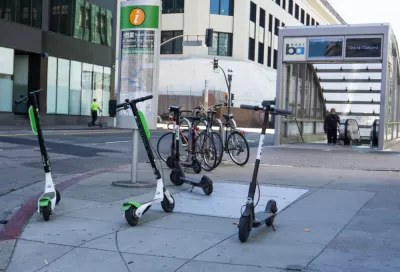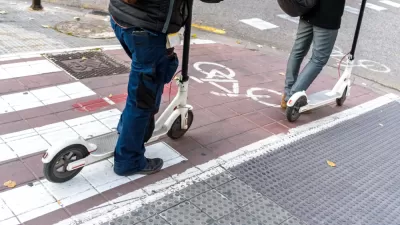With some strategic planning on the part of transit agencies and operators, shared e-scooters can be an important ally in the fight against car dependence.

E-scooters have the potential for an important role in a comprehensive public transit system, writes Xiang ‘Jacob’ Yan in Greater Greater Washington. Despite their reputation as mostly recreational, "research suggests that most e-scooter trips are not taken for fun but for utilitarian purposes such as work and school commuting. In the past year, for those avoiding crowded spaces like buses and trains because of COVID-19, e-scooters can be a lifeline for people with few other travel options." Washington, D.C., according to Yan, "has been a pioneer in embracing e-scooters and e-bikes and developing regulations to make them a safe, accessible, and equitable travel option."
"There are good reasons to worry that privately operated e-scooters — much like ridesharing companies like Uber and Lyft — could draw riders away from transit and hence threaten the recovery of public transit systems." Indeed, Yan's research shows that "more than 90% of e-scooter trips could have been made by Metro or CaBi." However, in many instances, "[e-scooter] usage was different from the Capital Bikeshare (CaBi) system — the services were complementary, not competitive." Prior to the pandemic, "between 8% and 12% of all e-scooter trips were taken to connect with Metrorail."
Yan argues that "the popularity of e-scooters and e-bikes suggests that cities like DC should be treating dockless vehicles as an essential component of public transportation systems" and "find ways to make e-scooters complement rather than compete with existing public transportation systems." Through some collaborative planning with the e-scooter operators, DDOT can foster a "harmonious integration of e-scooter services with Capital Bikeshare and Metro." Transit agencies can "promote e-scooters as a last-mile feeder to public transit" by creating safe and convenient infrastructure such as e-scooter parking and charging stations at transit hubs, bike and scooter lanes to make riding safer, and integrated fare payments or bundled pricing. To achieve these advancements, writes Yan, transportation officials must "think of e-scooters not as a separate mode but as a part of the transportation ecosystem," bringing the industry in as "an important ally in the war against car dependence."
FULL STORY: Make e-scooters work with transit, not against it

Planetizen Federal Action Tracker
A weekly monitor of how Trump’s orders and actions are impacting planners and planning in America.

Map: Where Senate Republicans Want to Sell Your Public Lands
For public land advocates, the Senate Republicans’ proposal to sell millions of acres of public land in the West is “the biggest fight of their careers.”

Restaurant Patios Were a Pandemic Win — Why Were They so Hard to Keep?
Social distancing requirements and changes in travel patterns prompted cities to pilot new uses for street and sidewalk space. Then it got complicated.

Platform Pilsner: Vancouver Transit Agency Releases... a Beer?
TransLink will receive a portion of every sale of the four-pack.

Toronto Weighs Cheaper Transit, Parking Hikes for Major Events
Special event rates would take effect during large festivals, sports games and concerts to ‘discourage driving, manage congestion and free up space for transit.”

Berlin to Consider Car-Free Zone Larger Than Manhattan
The area bound by the 22-mile Ringbahn would still allow 12 uses of a private automobile per year per person, and several other exemptions.
Urban Design for Planners 1: Software Tools
This six-course series explores essential urban design concepts using open source software and equips planners with the tools they need to participate fully in the urban design process.
Planning for Universal Design
Learn the tools for implementing Universal Design in planning regulations.
Heyer Gruel & Associates PA
JM Goldson LLC
Custer County Colorado
City of Camden Redevelopment Agency
City of Astoria
Transportation Research & Education Center (TREC) at Portland State University
Camden Redevelopment Agency
City of Claremont
Municipality of Princeton (NJ)





























